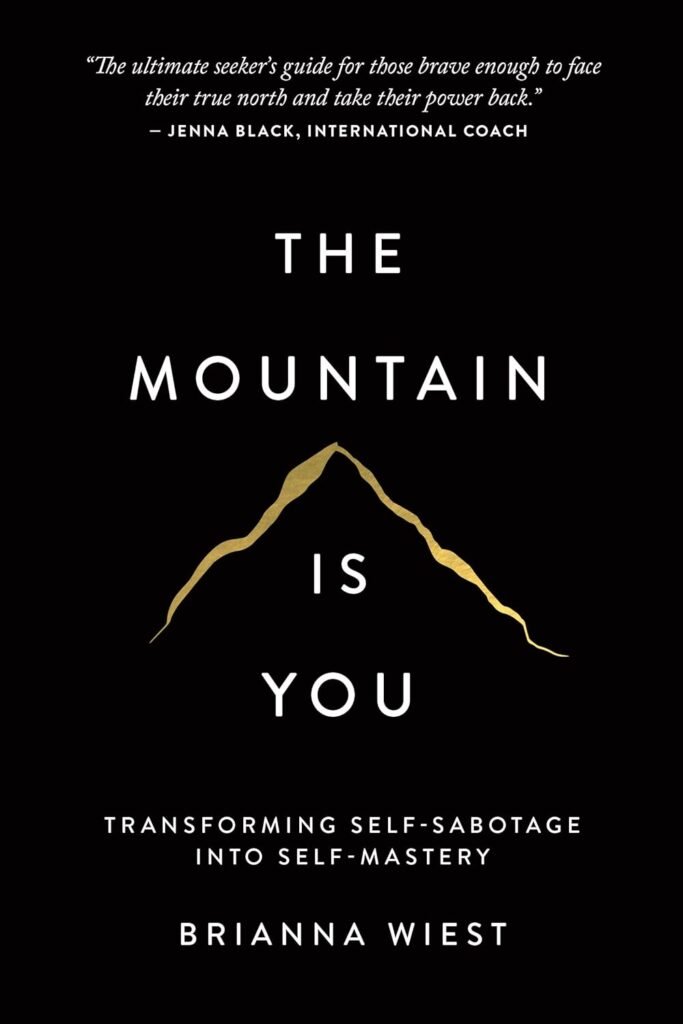We hold ourselves back from our full potential.
Most often, we don’t know why we act against our own best interests, and more often than not, we avoid thinking about the pain that lies beneath. Read on for a few author mindset tips.

“Just as a mountain is formed when two sections of the ground are forced against one another, your mountain will arise out of coexisting but conflicting needs. Your mountain requires you to reconcile two parts of you: the conscious and the unconscious, the part of you that is aware of what you want and the part of you that is not aware of why you are still holding yourself back.” — Brianna Wiest, The Mountain Is You: Transforming Self-Sabotage Into Self-Mastery (1)
If you dare to look into the mirror for some self-reflection, I recommend West’s book, taken a bit at a time. It’s definitely not a book you can absorb in one sitting.

Negative Associations with Success
I will leave the rest of the book for you to read; however, this one sentence really stuck with me:
“When we self-sabotage, it is often because we have a negative association between achieving the goal we aspire to and being the kind of person who has or does that thing.” (2)
What you think about yourself is your reality.
Your inner voice may repeat things you heard when you were younger:
- “Money doesn’t grow on trees.”
- “We don’t have enough money for that.”
- “You talk too much.”
- “Don’t be obnoxious.”
- “You read too much.”
- “People don’t like it when …”
As we age, we might tell ourselves:
- “I’m not good with money.”
- “I don’t have the time to …”
- “I’m always worried about …”
- “I couldn’t possibly …”
- “Today isn’t going to be a good day.”
The brain is flexible and programmable. If it hears a phrase often enough, that becomes its truth.
Take control of your inner voice.
Make a conscious effort to monitor and correct your inner voice, and you will be surprised by how your outlook will brighten over time.
Tell your brain more positive things:
- “You can do this.”
- “You’re almost there.”
- “Every little bit helps.”
I’m not talking about lying to yourself.
If you need to face the truth about yourself or a situation, do it, but instead of letting a weakness or poor result defeat you, take a positive, constructive approach to getting stronger or changing an outcome.
For authors, don’t say (or think): “I’m never going to finish writing this book.”
Instead, tell yourself: “I’m making progress. I can do this.”

Jealousy is a tell.
Authors often suffer from comparisonitis, when we compare the beginning or our writing journey to someone else’s middle.
We sneer and say, “Must be nice to __ (fill in the blank.)”
Let’s see. It must be nice to have 2,000 subscribers; it would be easy to launch a book with 2,000 followers.
It must be nice to have ten books in your backlist. (I’m sure that’s true.)
Those jealousy pain points reveal what we really want: to have ten titles and a decent author platform. It’s easier to be jealous than to get out of our own way and get the work done.
You may be allergic to success.
My family has a long history of putting down the wealthy and—Dare I say?—subconsciously avoiding wealth due to unhealthy attitudes about money.
Beware of what you tell yourself about money and success and especially about the ideas you communicate to your children regarding the same.
In these days of billionaires, it’s easier than ever to believe wealthy people are universally selfish and evil.
Ask yourself if you are subconsciously resisting financial success because you’re afraid of what people will think or say about you if you earn enough to be “comfortable” or “well off.”
Honestly, you may need to reprogram how you talk about people who are experiencing success, especially successful authors.
Putting people down for being successful is programming your brain to avoid success, and remember, jealousy is a tell.
Make positive self-talk an important part of your daily system.
“Goals are good for setting a direction, but systems are best for making progress.” —James Clear, Atomic Habits
Make positive and constructive self-talk part of your SYSTEM for attaining your goals and aspirations. How you think directly influences your outcomes. This is one of the most important author mindset tips to internalize.
Take control of your thoughts. Examine. Question. Reframe. Redirect. Reprogram. Rinse and repeat.
(And this is where I must state: I am not a mental health expert and this is not intended as medical advice. I’m just an author who has made the trip around the sun many times.)
Question: What is the best thing you regularly tell yourself that has helped you overcome adversity? Please share.
Currently, new author cohorts are forming at https://www.writingpursuits.com/cohorts/.
Resources:
- (1) Wiest, Brianna. The Mountain Is You: Transforming Self-Sabotage Into Self-Mastery (p. 6). Thought Catalog Books. Kindle Edition. “
- (2) Wiest, Brianna. The Mountain Is You: Transforming Self-Sabotage Into Self-Mastery (p. 16). Thought Catalog Books. Kindle Edition. “
- “Forget About Setting Goals. Focus on This Instead.” by James Clear
